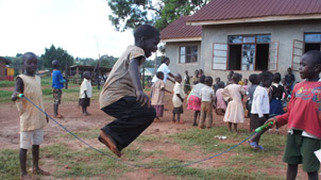 We last reported about how children from the slums of Soweto, a community of displaced people on the outskirts of Jinja, Uganda now have their own safe place to go to, where they can play, learn and eat. Since then our Grants Officer, Ashley Kuchanny and our director, Rachel Bentley have both been out to the project to monitor the progress that the Centre is making possible for these children. Even though it’s still early days they have both witnessed striking changes and encouraging evidence that the community is starting to turn around. “As you walk around Soweto there is still black, toxic sludge from the breweries every 15-20 metres” says Ashley. “The smoke is acrid, the sludge pits have no fences and many children still scour the rubbish dump for slivers of charcoal, but the blackness of the area is starting to lift. There is less rubbish, it’s cleaner and the Centre is now a safe hub for the children of the community”. It was found that as many as 40 children at the Centre (a third of those who attend), didn’t even know their own names. This is a result of many parents dying of AIDS in the area, leaving children in the care of elderly grandparents, some of whom are looking after up to 10 children at a time. Within the chaos of such a big family, without adequate care, a child’s identity can be lost. One of the first things we did at the centre was to find out the children’s names, and help them to learn them. It’s a small task, with huge implications for each child’s self worth and identity. On her trip Ashley did a social mapping exercise with our local partners and beneficiaries, not using pens and paper but local materials like bottle tops, flowers and ash. Here they identified areas where they felt frightened and in danger, as well as areas they felt safe. Whilst our child centre was shown to be a place of safety, both the children and the parents identified the railway line as a prime site for abductions and abuse. The study went on to reveal a number of film halls throughout the area where children are lured in and abused. Disturbingly one of these places was found to be directly opposite the child centre itself. By the time Rachel visited 2 months later, staff from the project had successfully got this film hall closed down. Rachel’s visit last month also revealed some incredible progress for the children. “The children are looking well nourished and healthy, they are enjoying creative and colourful activities rather than learning by rote on benches” says Rachel. “Not only this, but the child protection committee have worked in safe principles for visitors and have fast become the ‘go-to’ group for child protection advice throughout Soweto”. Watch this space for further encouraging stories from Soweto, find out more about our work here and consider donating to the project. Support usComments are closed.
|
RECEIVE OUR EMAILSBlog Categories
All
Archives
July 2024
|
|
JOIN US ON SOCIAL MEDIA
|
Annual Report | Contact Us | Jobs | Media Centre | Resources | Shop
Accessibility & Policies: Accessibility | Equity, Diversity & Inclusion Policy | Complaints| Privacy Policy | Safeguarding
Accessibility & Policies: Accessibility | Equity, Diversity & Inclusion Policy | Complaints| Privacy Policy | Safeguarding
Children on the Edge, 5 The Victoria, 25 St Pancras, Chichester, West Sussex, PO19 7LT, UK | 01243 538530 | [email protected]


 Give monthly
Give monthly Fundraise for us
Fundraise for us RSS Feed
RSS Feed
